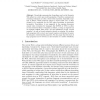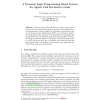1036 search results - page 79 / 208 » Incompleteness of Behavioral Logics |
AGP
1994
IEEE
15 years 2 months ago
1994
IEEE
Kowalski and Sergot's Event Calculus (EC) is a formalism for reasoning about time and change in a logic programming framework. From a description of events which occur in the...
110
click to vote
ESWS
2006
Springer
15 years 1 months ago
2006
Springer
Knowledge representation formalisms used on the Semantic Web adhere to a strict open world assumption. Therefore, nonmonotonic reasoning techniques are often viewed with scepticism...
IJCAI
2003
14 years 11 months ago
2003
Query answering over commonsense knowledge bases typically employs a first-order logic theorem prover. While first-order inference is intractable in general, provers can often b...
LPNMR
2009
Springer
15 years 4 months ago
2009
Springer
We consider random logic programs with two-literal rules and study their properties. In particular, we obtain results on the probability that random “sparse” and “dense” pr...
DALT
2006
Springer
15 years 1 months ago
2006
Springer
Goals are used to define the behavior of (pro-active) agents. It is our view that the goals of an agent can be seen as a knowledge base of the situations that it wants to achieve. ...


